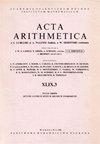Transcendence and continued fraction expansion of values of Hecke–Mahler series
IF 0.5
3区 数学
Q3 MATHEMATICS
引用次数: 0
Abstract
Let $\theta$ and $\rho$ be real numbers with $0 \le \theta, \rho<1$ and $\theta$ irrational. We show that the Hecke-Mahler series $$ F_{\theta, \rho} (z_1, z_2) = \sum_{k_1 \ge 1} \, \sum_{k_2 = 1}^{\lfloor k_1 \theta + \rho \rfloor} \, z_1^{k_1} z_2^{k_2}, $$ where $\lfloor \cdot \rfloor$ denotes the integer part function, takes transcendental values at any algebraic point $(\beta, \alpha)$ with $0<|\beta|, |\beta \alpha^\theta |<1$. This extends earlier results of Mahler (1929) and Loxton and van der Poorten (1977), who settled the case $\rho=0$. Furthermore, for positive integers $b$ and $a$, with $b \ge 2$ and $a$ congruent to $1$ modulo $b-1$, we give the continued fraction expansion of the number $$ {(b-1)^2\over b} F_{\theta, \rho} \left({1\over b}, {1\over a}\right)+{\lfloor \theta+\rho\rfloor(b-1)\over b^2a}, $$ from which we derive a formula giving the irrationality exponent of $F_{\theta, \rho} (1/b, 1/a)$.Hecke-Mahler级数值的超越与连分式展开性
设$\theta$和$\rho$为实数,$0 \le \theta, \rho<1$和$\theta$为无理数。我们证明了Hecke-Mahler级数$$ F_{\theta, \rho} (z_1, z_2) = \sum_{k_1 \ge 1} \, \sum_{k_2 = 1}^{\lfloor k_1 \theta + \rho \rfloor} \, z_1^{k_1} z_2^{k_2}, $$(其中$\lfloor \cdot \rfloor$表示整数部分函数)在任意代数点$(\beta, \alpha)$与$0<|\beta|, |\beta \alpha^\theta |<1$取超越值。这延伸了Mahler(1929)和Loxton和van der Poorten(1977)的早期结果,他们解决了这个问题$\rho=0$。更进一步,对于正整数$b$和$a$,当$b \ge 2$和$a$与$1$模$b-1$相等时,我们给出了数字$$ {(b-1)^2\over b} F_{\theta, \rho} \left({1\over b}, {1\over a}\right)+{\lfloor \theta+\rho\rfloor(b-1)\over b^2a}, $$的连分式展开式,由此我们推导出了一个公式,给出了$F_{\theta, \rho} (1/b, 1/a)$的无理数指数。
本文章由计算机程序翻译,如有差异,请以英文原文为准。
求助全文
约1分钟内获得全文
求助全文
来源期刊

Acta Arithmetica
数学-数学
CiteScore
1.00
自引率
14.30%
发文量
64
审稿时长
4-8 weeks
期刊介绍:
The journal publishes papers on the Theory of Numbers.
 求助内容:
求助内容: 应助结果提醒方式:
应助结果提醒方式:


